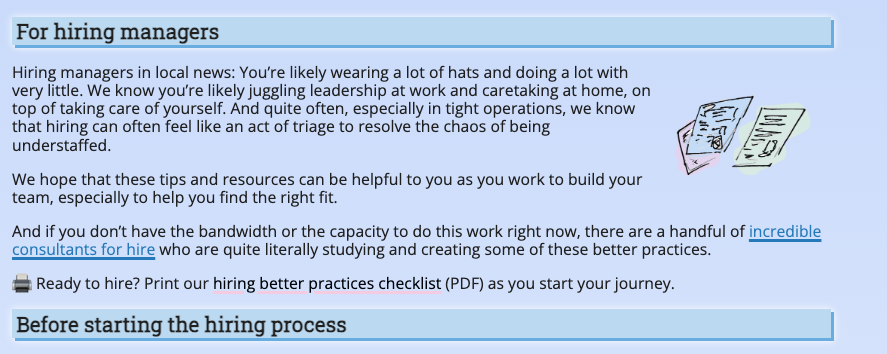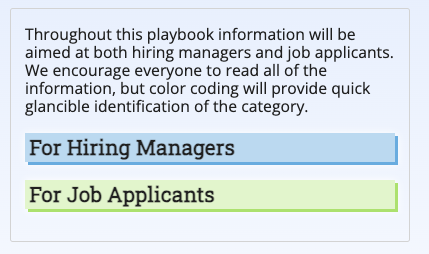
A guide to better hiring (and getting hired) practices
Expert advice to face the many stages of hiring and getting hired
The Center for Innovation and Sustainability in Local Media (CISLM) and the Reynolds Journalism Institute have built a better practices playbook for hiring and getting hired.
We created a list of professionals in four categories — recruiting, student media, talent development and career services — and developed interview templates to provide structured guidance for those who use this guide.
This guide leads you through the expert advice of how to face the many stages of hiring and getting hired. There are two separate sections — for hiring managers and for applicants — that contains often-heard and key words of wisdom from our experts based on the stages of the hiring process.
Our hope is that this can shed some light and create more transparency for all in the hiring process, especially for candidates who may not have easy access to journalism professionals.
Where we started
This project stemmed from interviews and feedback from students, professors and journalism professionals. While we’re aware the journalism industry needs to build a hiring and retention system that supports journalists throughout their careers, we wanted to start at the beginning, so this resource focuses on early-career journalists.
We had a few goals with the project:
- Compiling better hiring practices from a diverse, thoughtful group of professionals across the news space who are often bringing folks into news (not “best” practice, as this work is constantly evolving)
- Highlighting some of the folks and organizations pioneering this work
- Creating an accessible, public set of standards to help create accountability
We also included resources that already exist and ways to get in touch with consultants for a more robust and full picture of the existing landscape and tools out there.

How we built it
So often in journalism we hear concerns about working conditions, pay or instability which may prevent otherwise interested early-career journalists from entering the field. We also hear concerns about hiring from the professional side. CISLM works with news organizations across the Southeast and we often are asked how to better attract early-career journalists and be more competitive in hiring.
We reached out to dozens of folks and spoke to 25 individuals across the four categories mentioned. We knew we wanted a larger sample size for these interviews, with multiple folks conducting these interviews using standardized questions by category.
For the questions asked, we were primarily concerned with questions that could pull out actionable advice focused on more transparent, equitable, and intentional hiring practices and processes.

In terms of the selection process, we looked for professionals doing work in fellowships in well-known places such as Reynolds Journalism Institute, JSK Fellowships, Nieman Fellowships, Wallace House and more. We searched industry publications archives to find more professionals.
For less widely publicized roles, such as career services counselors, we looked first for professionals who worked in journalism-specific schools rather than in a general career services role. We wanted the widest possible variety of experiences, reaching out to folks in community colleges, historically Black colleges and universities, public four-year and private universities.
For recruiters, we tried to get a variety of sources from both corporate-led and more independent news organizations, including folks who are now teaching after years of recruitment. We also tried to diversify perspectives on recruitment by media type.
For talent development professionals, we reached out to folks who are leading fellowship and internship programs that bring early career journalists into the field, or folks who are creating content that informs early career journalists on how to enter the field.
After the interview process was complete, CISLM Director Erica Perel led us in an exercise where we pulled out the most powerful and recurring pieces of wisdom from across the interviews and organized accordingly.
If you’re interested in sharing your work, have feedback or want to let us know how you’re utilizing this guide, please let us know at cislm@unc.edu or will.lager@rjionline.org.
